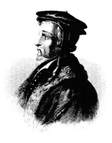- John Austin Baker - Tammy Faye Bakker - Wayne Barber - William Barclay - Basil of Caesara - Ern Baxter - Thomas Becon - V Gilbert Beers - Richard Meux Benson - WE Best - John Blanchard - Andrew Bonar - Horatius Bonar - St. Bonaventure - Richard Bonnke - Thomas Boston -
==john austin baker=============
John Austin Baker (11 January 1928 – 4 June 2014) was a Church of England bishop, Bishop of Salisbury from 1982 until his retirement in 1993. Made a deacon at Michaelmas 1954 (19 September), by Robert Hay, Bishop of Buckingham, at High Wycombe parish church, and ordained priest in 1955, he began his ministry with curacies at All Saint's Cuddesdon and St Anselm's Hatch End, after which he was a fellow and lecturer at Corpus Christi College, Oxford until 1973. From then until his ordination to the episcopate he was a residential canon at Westminster Abbey and also for some years chaplain to the Speaker of the House of Commons. He was consecrated a bishop on 2 February 1982, by Robert Runcie, Archbishop of Canterbury, at Westminster Abbey.
 John Austin Baker
John Austin Baker
“Love cannot be explained; you cannot give lessons in it. You either ‘see’ what it is about or you do not; you either catch its spirit or you go through life without it. You cannot imitate it, or do its works as a duty. It has to be spontaneous, a free commitment. If therefore God has made the world an arena for love, then he himself is a lover. This means that he is vulnerable—not by nature, as we are to help us discover love, but by deliberate choice, that is, by love itself which must be the heart of his own being.”— John Austin Baker, The Foolishness of God
==tammy faye bakker==============
Tamara Faye Messner ( March 7, 1942 – July 20, 2007) was an American evangelist, singer, author, talk show host, and television personality. She gained notice for her work with The PTL Club, a televangelist program she co-founded with her husband Jim Bakker in 1974. They had hosted their own puppet-show series for local programming in the early 1960s; Messner also had a career as a recording artist. In 1978, she and Bakker built Heritage USA, a Christian theme park

Deep into the AIDS crisis in October 1985, a prominent Los Angeles minister named Stephen Pieters traveled to a television studio for a satellite-link interview that his friends begged him to avoid.
On the other end was the Pentecostal televangelist Tammy Faye Bakker, of the Charlotte-based PTL Television Network. Then at her peak, with more than 13 million viewers, she and her broadcaster husband, Jim, held great sway with conservative Christian followers whose beliefs were seen as sharply at odds with the gay community and AIDS patients such as Rev. Pieters.
“It would wreck my reputation as a liberal gay activist preacher,” Rev. Pieters, who died July 8 at 70, recalled being told. But the 25-minute segment became a watershed in public perceptions about AIDS. Rev. Pieters also emerged as an eloquent and nationally renowned spokesman for those facing AIDS, which at the time was considered not only a likely death sentence but also put patients at high risk for experiencing shame and humiliation. -Washington Post: The Rev. Stephen Pieters, who helped shift views on AIDS, dies at 70 7.11.23
On the other end was the Pentecostal televangelist Tammy Faye Bakker, of the Charlotte-based PTL Television Network. Then at her peak, with more than 13 million viewers, she and her broadcaster husband, Jim, held great sway with conservative Christian followers whose beliefs were seen as sharply at odds with the gay community and AIDS patients such as Rev. Pieters.
“It would wreck my reputation as a liberal gay activist preacher,” Rev. Pieters, who died July 8 at 70, recalled being told. But the 25-minute segment became a watershed in public perceptions about AIDS. Rev. Pieters also emerged as an eloquent and nationally renowned spokesman for those facing AIDS, which at the time was considered not only a likely death sentence but also put patients at high risk for experiencing shame and humiliation. -Washington Post: The Rev. Stephen Pieters, who helped shift views on AIDS, dies at 70 7.11.23
==wayne barber===================
 Wayne Barber
Wayne Barber
In Ephesians 1 we find the riches of our salvation. It is important for every believer to know who he is and what he has in the Lord Jesus Christ. Ephesians 1:3 sums it all up. He says He has given us every spiritual blessing in Christ Jesus. The First National Bank of God is Jesus Christ, and we have everything spiritually that we will ever need in Him. We are rich today in Jesus Christ.
--Wayne Barber
william barclay
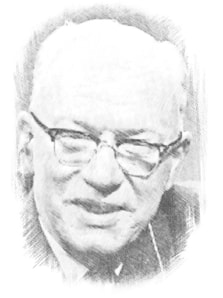 William Barclay
William Barclay
The idea behind the word parable is “to throw alongside of.” It is a story thrown alongside the truth intended to teach. Parables have been called “earthly stories with a heavenly meaning.”
i. “The Greek parabole is wider than our ‘parable’; in the LXX it translates masal, which includes proverbs, riddles and wise sayings as well as parables. Matthew uses it for instance for Jesus’ cryptic saying about defilement (Matthew 15:10-11, 15), and in Matthew 24:32 (‘lesson’) it indicates a comparison.” (France)
ii. “It had a double advantage upon their hearers: first, upon their memory, we being very apt to remember stories. Second, upon their minds, to put them upon studying the meaning of what they heard so delivered.” (Poole)
iii. Parables generally teach one main point or principle. We can get into trouble by expecting that they be intricate systems of theology, with the smallest detail revealing hidden truths. “A parable is not an allegory; an allegory is a story in which every possible detail has an inner meaning; but an allegory has to be read and studied; a parable is heard. We must be very careful not to make allegories of the parables.” --William Barclay
i. “The Greek parabole is wider than our ‘parable’; in the LXX it translates masal, which includes proverbs, riddles and wise sayings as well as parables. Matthew uses it for instance for Jesus’ cryptic saying about defilement (Matthew 15:10-11, 15), and in Matthew 24:32 (‘lesson’) it indicates a comparison.” (France)
ii. “It had a double advantage upon their hearers: first, upon their memory, we being very apt to remember stories. Second, upon their minds, to put them upon studying the meaning of what they heard so delivered.” (Poole)
iii. Parables generally teach one main point or principle. We can get into trouble by expecting that they be intricate systems of theology, with the smallest detail revealing hidden truths. “A parable is not an allegory; an allegory is a story in which every possible detail has an inner meaning; but an allegory has to be read and studied; a parable is heard. We must be very careful not to make allegories of the parables.” --William Barclay
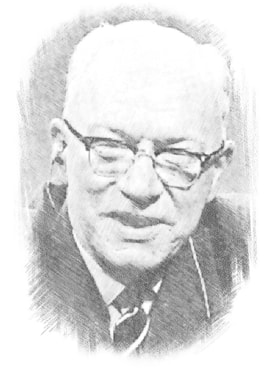 William Barclay
William Barclay
Let us stop there and see the truth so far in this parable.
(i) It should never have been called the parable of the Prodigal Son, for the son is not the hero. It should be called the parable of the Loving Father, for it tells us rather about a father's love than a son's sin.
(ii) It tells us much about the forgiveness of God. The father must have been waiting and watching for the son to come home, for he saw him a long way off. When he came, he forgave him with no recriminations. There is a way of forgiving, when forgiveness is conferred as a favour. It is even worse, when someone is forgiven, but always by hint and by word and by threat his sin is held over him.
Once Lincoln was asked how he was going to treat the rebellious southerners when they had finally been defeated and had returned to the Union of the United States. The questioner expected that Lincoln would take a dire vengeance, but he answered, "I will treat them as if they had never been away."
It is the wonder of the love of God that he treats us like that.
That is not the end of the story. There enters the elder brother who was actually sorry that his brother had come home. He stands for the self-righteous Pharisees who would rather see a sinner destroyed than saved. Certain things stand out about him.
(i) His attitude shows that his years of obedience to his father had been years of grim duty and not of loving service.
(ii) His attitude is one of utter lack of sympathy. He refers to the prodigal, not as any brother, but as your son. He was the kind of self-righteous character who would cheerfully have kicked a man farther into the gutter when he was already down.
(iii) He had a peculiarly nasty mind. There is no mention of harlots until he mentions them. He, no doubt, suspected his brother of the sins he himself would have liked to commit.
Once again we have the amazing truth that it is easier to confess to God than it is to many a man; that God is more merciful in his judgments than many an orthodox man; that the love of God is far broader than the love of man; and that God can forgive when men refuse to forgive. In face of a love like that we cannot be other than lost in wonder, love and praise. --William Barclay
(i) It should never have been called the parable of the Prodigal Son, for the son is not the hero. It should be called the parable of the Loving Father, for it tells us rather about a father's love than a son's sin.
(ii) It tells us much about the forgiveness of God. The father must have been waiting and watching for the son to come home, for he saw him a long way off. When he came, he forgave him with no recriminations. There is a way of forgiving, when forgiveness is conferred as a favour. It is even worse, when someone is forgiven, but always by hint and by word and by threat his sin is held over him.
Once Lincoln was asked how he was going to treat the rebellious southerners when they had finally been defeated and had returned to the Union of the United States. The questioner expected that Lincoln would take a dire vengeance, but he answered, "I will treat them as if they had never been away."
It is the wonder of the love of God that he treats us like that.
That is not the end of the story. There enters the elder brother who was actually sorry that his brother had come home. He stands for the self-righteous Pharisees who would rather see a sinner destroyed than saved. Certain things stand out about him.
(i) His attitude shows that his years of obedience to his father had been years of grim duty and not of loving service.
(ii) His attitude is one of utter lack of sympathy. He refers to the prodigal, not as any brother, but as your son. He was the kind of self-righteous character who would cheerfully have kicked a man farther into the gutter when he was already down.
(iii) He had a peculiarly nasty mind. There is no mention of harlots until he mentions them. He, no doubt, suspected his brother of the sins he himself would have liked to commit.
Once again we have the amazing truth that it is easier to confess to God than it is to many a man; that God is more merciful in his judgments than many an orthodox man; that the love of God is far broader than the love of man; and that God can forgive when men refuse to forgive. In face of a love like that we cannot be other than lost in wonder, love and praise. --William Barclay
==Basil of Caesara=============
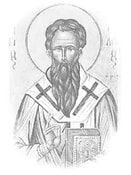 St Basil
St Basil
"John has admirably confined the conception within circumscribed boundaries by two words, ‘In the beginning was the Word.’ For thought cannot travel outside ‘was,’ nor imagination beyond ‘beginning‘. Let your thought travel ever so far backward you cannot get beyond the ‘was,’ and however you may strain and strive to see what is beyond the Son, you will find it impossible to get further than the ‘beginning.’ True religion, therefore, thus teaches us to think of the Son together with the Father.” -St. Basil the Great; On The Spirit
==ern baxter=================
William John Ernest (Ern) Baxter (1914–1993) was a Canadian Pentecostal evangelist. Born in
Saskatchewan, Canada, he was baptised into a Presbyterian family. His mother was involved with a
holiness church and following his father’s conversion they went into classical Pentecostalism. Their city was visited by a Scandinavian itinerant minister with a "signs and wonders" approach to Christianity. While in the Baxter’s home city, he taught on the baptism in the Holy Spirit. Ern Baxter’s mother was the first in those meetings to receive the "baptism of power." Baxter recalled seeing his father help her into the house drunk in the Spirit. Later in his teenage years, Baxter went through a period where he lost his faith in reaction to the legalism of religion and became seriously ill from pneumonia.
Saskatchewan, Canada, he was baptised into a Presbyterian family. His mother was involved with a
holiness church and following his father’s conversion they went into classical Pentecostalism. Their city was visited by a Scandinavian itinerant minister with a "signs and wonders" approach to Christianity. While in the Baxter’s home city, he taught on the baptism in the Holy Spirit. Ern Baxter’s mother was the first in those meetings to receive the "baptism of power." Baxter recalled seeing his father help her into the house drunk in the Spirit. Later in his teenage years, Baxter went through a period where he lost his faith in reaction to the legalism of religion and became seriously ill from pneumonia.
"God is spoken of more as being angry than He is loving. And anger is the counter side of love and it's essential to maintain the purity of love. Love without moral indignation is sloppy guk. It's unworthy of all of us, but it's infinetely unworthy of God." --Ern Baxter
==thomas becon====================
Thomas Beccon or Becon (c. 1511–1567) was an English cleric and Protestant reformer from Norfolk. He entered the University of Cambridge in March 1526-27, probably St John's College. He studied under Hugh Latimer and was ordained in 1533. In 1532 he was admitted a member of the community of the College of St. John the Evangelist, Rushworth - now Rushford.
==V gilbert Beers======
V. Gilbert Beers, author of Christian books and former Christianity Today editor, dies
V. Gilbert Beers was a prolific author of Christian books and reference materials and was the editor of Christianity Today magazine in the 1980s. Beers, 95, died of pneumonia on Feb. 28 at a hospice center in Naperville, said his son, Ron. He was previously a longtime Elgin resident. Victor Gilbert Beers was born in the tiny downstate community of Sidell, the son of a grain farmer. He received a bachelor’s degree from Wheaton College in 1950. He then earned a master’s degree in religious education in 1953 from Northern Baptist Theological Seminary, and he picked up a bachelor of divinity degree from the seminary the following year and a master of theology degree in 1955. (Chicago Tribune 4/2/24) READ MORE>>>>>
V. Gilbert Beers was a prolific author of Christian books and reference materials and was the editor of Christianity Today magazine in the 1980s. Beers, 95, died of pneumonia on Feb. 28 at a hospice center in Naperville, said his son, Ron. He was previously a longtime Elgin resident. Victor Gilbert Beers was born in the tiny downstate community of Sidell, the son of a grain farmer. He received a bachelor’s degree from Wheaton College in 1950. He then earned a master’s degree in religious education in 1953 from Northern Baptist Theological Seminary, and he picked up a bachelor of divinity degree from the seminary the following year and a master of theology degree in 1955. (Chicago Tribune 4/2/24) READ MORE>>>>>
==Richard Meux Benson======
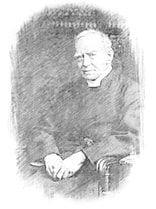 Richardx Meux Benson
Richardx Meux Benson
“Think of the Holy Ghost dwelling within us, mindful of all our past sins. But his memory of our sins is not censorious. It is not that he would reproach us, as weak mean-spirited persons regard someone who has strayed, eager to accuse while thinking to make escape impossible. The memory of the Holy Ghost is the memory of magnanimous love. He remembers our past sin most truly, but only because he desires to deliver us from it. He would teach us to remember it, he would bring us to the same remembrance as his, but only to effect our deliverance. He desires that all this work of sin may be done away, that all these full powers of his love may stream forth on our soul, and that he may ‘see of the travail’ of his divine purpose ‘and be satisfied'(Is. 53:11), as we are formed anew and perfected in the very image of Christ.” ~ Richard Meux Benson, Look to the Glory
==w.e. best===================
Wilbern Elias Best was born on June 18, 1919, in East Texas. He died on June 15, 2007, after being ill for several years. Converted at the age of 20, he began to preach soon after, and pastored several churches, the last being in Houston, Texas. He was an avid reader, spending most of his days in the study of God’s Word, and was well versed in both Greek and Hebrew. Although he began preaching in a Baptist church, the assembly eventually became non-denominational. He wrote 25 books and pamphlets composed of sermons he preached to his congregation. These books were distributed in English and Spanish around the world from 1970 to 2018 at no cost via the W.E. Best Book Missionary Trust.
 WE Best
WE Best
The confusion today is not objective but subjective. In other words the real problem lies in the subjective condition of man's heart: "The heart is deceitful above all things, and desperately wicked.." (Jer 17:9). Our only safeguard is the objective revelation of Jesus Christ. Man-made concepts of Jesus Christ are easily turned into opposite concepts.
--WE Best; Christ Could Not be Tempted; 1986
--WE Best; Christ Could Not be Tempted; 1986
 WE Best
WE Best
The Bible defines sin as transgression of the law (I John 3:4). Man is subject to certain desires which are essential to human nature. However, these desires are to be gratified in God's appointed ways. Adam failed to do this. Therefore, he fell and all his posterity fell in him. Temptation is outward allurement. It suggests to inward depravity the advantage of succumbing to the outward attraction. Thus, man's inward weakness is influenced to some object of natural desire. Without the restraint of the fear of God (Jer 32:40), a man will submit to fulfilling his inward evil desire. --WE Best; Christ Could Not be Tempted; 1986
“Love looks through a telescope; envy, through a microscope.” ― Josh Billings
“Consider the postage stamp: its usefulness consists in the ability to stick to one thing till it gets there.”
― Josh Billings
― Josh Billings
"There is no revenge so complete as forgiveness."― Josh Billings
“One of the greatest victories you can gain over someone is to beat him at politeness.”
― Josh Billings
― Josh Billings
==john blanchard=================
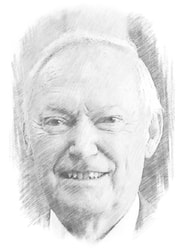 John Blanchard Files
John Blanchard Files
Woody Allen, the well-known movie director, screenwriter, and actor, once said, “I’m not afraid to die. I just don’t want to be there when it happens.” The quirky quotation is famous but fatally flawed. God has the date of every person’s death in his calendar, and there is nothing that anyone can do to have this divinely made appointment cancelled or postponed: “No man has power to retain the spirit, or power over the day of death” (Eccl. 8:8).
For millions the world over, the inevitability of death casts a growing shadow over life. The internationally renowned British artist Damien Hirst, said to be worth more than $300 million, told the Daily Telegraph Review: “Death is definitely something that I think about every day…. You try to avoid it, but it’s such a big thing that you can’t.” The Bible speaks of many who “through fear of death” are “subject to lifelong slavery” (Heb. 2:15). In countless cases, their chains are forged by fear of the unknown. As Professor Edgar Andrews puts it, “Uncertainty breeds fear. And fear brings mental bondage, casting its inescapable shadow over life and robbing man of lasting peace or joy.” Yet this sobering scenario ought not to include Christians, supremely because they can have the assurance of being “in Christ” (2 Cor. 5:17), the One who brought aboutwhat John Owen memorably called “the death of death.” As we get a clear grasp of what this means, one word sums up how we should approach death’s inevitable onset, and that word is gratefully.
First, we should be grateful that in the providence of God we were spared until we were saved. Once in my early years and twice in my teens, I was rescued from death. As a young boy on my native island of Guernsey, I fell into a huge barrel of water at the vinery where my father worked and was saved only because a workman happened to pass by. Years later, I was swimming at midnight in rough seas off the island’s south coast cliffs and was on the brink of drowning when rescued by a stronger swimmer. Not long afterward, I slipped while trying to work my way along a cliff face, and my despairing hand grasped a plant strong enough to hold me. Had I not survived all three incidents, this article could not have been written, and my spirit would now be in “chains of gloomy darkness” (2 Peter 2:4), waiting to be reunited with my resurrection body, that I might then be cast body and soul into hell.
When Jesus’ disciples returned from a preaching mission rejoicing at the amazing results they had seen, Jesus told them, “Do not rejoice in this, that the spirits are subject to you, but rejoice that your names are written in heaven” (Luke 10:20). As our earthly lives move toward their inevitable ends, we should constantly be grateful that “while we were still sinners, Christ died for us” (Rom. 5:8) and that God spared us until He brought us to lay hold on all that Christ’s death and resurrection accomplished on our behalf.
Second, we should be grateful that we have been preserved. The apostle John writes with a breaking heart about those who “went out from us, but they were not of us” (1 John 2:19). Although members of the organized, visible church, their defection showed that they had no part in the promise that “the one who endures to the end will be saved” (Matt. 24:13). When we reflect on our lives, not only with so many of John Newton’s “dangers, toils and snares” but with doubts and fears, trials and temptations, foibles and failures, compromise and cowardice, and the times when we have fallen into whatever sin “clings so closely” (Heb. 12:1) to us, how grateful we should be for God’s goodness and mercy. When we add the sobering truth that each one of us shares Paul’s testimony that “nothing good dwells in me, that is, in my flesh” (Rom. 7:18), no matter how long we have been Christians, we must surely consider it more than a minor miracle that we have been preserved.
When I visited the Billy Graham Library near Charlotte, N.C., the item that made the biggest impression on me was the rough-hewn stone that marks the grave of the evangelist’s wife, Ruth Bell Graham. She died on June 14, 2007, aged eighty-seven, and the stone bears the delightful inscription: “End of Construction — Thank you for your patience.” As we approach death, we should constantly be thanking God for His patient and sustaining grace.
Third, we should be grateful for the promise of what lies ahead. At the April 2010 funeral of Malcolm McLaren, manager of the rock band Sex Pistols, his hearse was draped with a line from one of their songs: “Too fast to live, too young to die.” McLaren had led a dazzling, chaotic, noisy, glamorous, and expensive life, but behind the hearse, a coach carrying mourners had a sign indicating McLaren’s supposed destination: “Nowhere.” Yet annihilation is no more than wishful thinking; it does nothing to eliminate the terrible truth that the ungodly face “eternal punishment” (Matt. 25:46). For Christians, the prospect is wonderfully different:
Think of what will be absent. “Death will be no more, neither shall there be mourning nor crying nor pain any more, for the former things have passed away” (Rev. 21:4). There will be no temptations to face, no burdens to bear, no guilt to grieve over, no sickness to battle, no unanswered questions to baffle us, no ignorance to humiliate us, and no unsatisfied desires to frustrate us. Nothing that has scarred and stained our lives on earth will be there to shame us. There will be no regrets, no remorse, no second thoughts, no disappointments, and no lost causes. Best of all, there will be no indwelling sin to plague us. As J.I. Packer puts it, “There will be no sin in heaven, for those who are in heaven will not have it in them to sin any more.” Small wonder that David cried out to God: “In your presence is fullness of joy; at your right hand are pleasures for evermore” (Ps. 16:11).
Think of who will be present. Heaven is the home of “innumerable angels” (Heb. 12:22), including cherubim, seraphim, and archangels, beings who have never sinned but have been praising and serving God in glorious and harmonious unity since the moment of their creation. All of God’s redeemed people — “a great multitude that no one could number, from every nation, from all tribes and peoples and languages” (Rev. 7:9) — will be there.
Best of all, our Savior will be there. Ever since my darling wife Joyce was called home last year, I have been sustained in the assurance that, as her memorial stone testifies, she is now “with Christ, which is far better” (Phil. 1:23), sharing the unimaginable bliss enjoyed by “the spirits of the righteous made perfect” (Heb. 12:2). A friend of mine, blind since he was eighteen months old, loves to say, “The next person I see will be Jesus.” It is impossible to imagine the wonder of what it will mean to “see him as he is” (1 John 3:2). Yet in fulfillment of God’s plan that His people be “conformed to the image of his Son” (Rom. 8:29), the Bible holds out an even more amazing promise: “We shall be like him” (1 John 3:3). What a staggering prospect. Picking up John’s “shorthand notes” in 1 John 3, we shall be as holy as He is holy, as righteous as He is righteous, as pure as He is pure. Even the weakest Christian on earth will be a glorious member of what D.L. Moody called “the aristocracy of holiness.” Amazingly, we shall not feel out of place in His presence.
How now shall we die? We may not have an easy journey into “the valley of the shadow of death” (Ps. 23:4); it may be prolonged and painful. Yet however our endurance (and even our faith) may be tested, how can we do other than make that inevitable journey in gratitude that by God’s unfathomable grace we were saved from sin’s penalty, have known His goodness and mercy in preserving us in the faith, and can be assured of discovering that, as John Bunyan wrote, “Death is but a passage out of a prison into a palace”? In a shaky hand just three days before he died, D. Martyn Lloyd-Jones wrote on a scrap of paper for his wife Bethan and their family: “Do not pray for healing. Do not hold me back from the glory.” It is no credit to our heavenly Father if we are reluctant to go home. Ironically, in the light of his view on eternal security, John Wesley was able to say of his early Methodists: “Our people die well.” If we die with grateful hearts, we will do the same
--John Blanchard; How Now Shall We Die 10.1.11
For millions the world over, the inevitability of death casts a growing shadow over life. The internationally renowned British artist Damien Hirst, said to be worth more than $300 million, told the Daily Telegraph Review: “Death is definitely something that I think about every day…. You try to avoid it, but it’s such a big thing that you can’t.” The Bible speaks of many who “through fear of death” are “subject to lifelong slavery” (Heb. 2:15). In countless cases, their chains are forged by fear of the unknown. As Professor Edgar Andrews puts it, “Uncertainty breeds fear. And fear brings mental bondage, casting its inescapable shadow over life and robbing man of lasting peace or joy.” Yet this sobering scenario ought not to include Christians, supremely because they can have the assurance of being “in Christ” (2 Cor. 5:17), the One who brought aboutwhat John Owen memorably called “the death of death.” As we get a clear grasp of what this means, one word sums up how we should approach death’s inevitable onset, and that word is gratefully.
First, we should be grateful that in the providence of God we were spared until we were saved. Once in my early years and twice in my teens, I was rescued from death. As a young boy on my native island of Guernsey, I fell into a huge barrel of water at the vinery where my father worked and was saved only because a workman happened to pass by. Years later, I was swimming at midnight in rough seas off the island’s south coast cliffs and was on the brink of drowning when rescued by a stronger swimmer. Not long afterward, I slipped while trying to work my way along a cliff face, and my despairing hand grasped a plant strong enough to hold me. Had I not survived all three incidents, this article could not have been written, and my spirit would now be in “chains of gloomy darkness” (2 Peter 2:4), waiting to be reunited with my resurrection body, that I might then be cast body and soul into hell.
When Jesus’ disciples returned from a preaching mission rejoicing at the amazing results they had seen, Jesus told them, “Do not rejoice in this, that the spirits are subject to you, but rejoice that your names are written in heaven” (Luke 10:20). As our earthly lives move toward their inevitable ends, we should constantly be grateful that “while we were still sinners, Christ died for us” (Rom. 5:8) and that God spared us until He brought us to lay hold on all that Christ’s death and resurrection accomplished on our behalf.
Second, we should be grateful that we have been preserved. The apostle John writes with a breaking heart about those who “went out from us, but they were not of us” (1 John 2:19). Although members of the organized, visible church, their defection showed that they had no part in the promise that “the one who endures to the end will be saved” (Matt. 24:13). When we reflect on our lives, not only with so many of John Newton’s “dangers, toils and snares” but with doubts and fears, trials and temptations, foibles and failures, compromise and cowardice, and the times when we have fallen into whatever sin “clings so closely” (Heb. 12:1) to us, how grateful we should be for God’s goodness and mercy. When we add the sobering truth that each one of us shares Paul’s testimony that “nothing good dwells in me, that is, in my flesh” (Rom. 7:18), no matter how long we have been Christians, we must surely consider it more than a minor miracle that we have been preserved.
When I visited the Billy Graham Library near Charlotte, N.C., the item that made the biggest impression on me was the rough-hewn stone that marks the grave of the evangelist’s wife, Ruth Bell Graham. She died on June 14, 2007, aged eighty-seven, and the stone bears the delightful inscription: “End of Construction — Thank you for your patience.” As we approach death, we should constantly be thanking God for His patient and sustaining grace.
Third, we should be grateful for the promise of what lies ahead. At the April 2010 funeral of Malcolm McLaren, manager of the rock band Sex Pistols, his hearse was draped with a line from one of their songs: “Too fast to live, too young to die.” McLaren had led a dazzling, chaotic, noisy, glamorous, and expensive life, but behind the hearse, a coach carrying mourners had a sign indicating McLaren’s supposed destination: “Nowhere.” Yet annihilation is no more than wishful thinking; it does nothing to eliminate the terrible truth that the ungodly face “eternal punishment” (Matt. 25:46). For Christians, the prospect is wonderfully different:
Think of what will be absent. “Death will be no more, neither shall there be mourning nor crying nor pain any more, for the former things have passed away” (Rev. 21:4). There will be no temptations to face, no burdens to bear, no guilt to grieve over, no sickness to battle, no unanswered questions to baffle us, no ignorance to humiliate us, and no unsatisfied desires to frustrate us. Nothing that has scarred and stained our lives on earth will be there to shame us. There will be no regrets, no remorse, no second thoughts, no disappointments, and no lost causes. Best of all, there will be no indwelling sin to plague us. As J.I. Packer puts it, “There will be no sin in heaven, for those who are in heaven will not have it in them to sin any more.” Small wonder that David cried out to God: “In your presence is fullness of joy; at your right hand are pleasures for evermore” (Ps. 16:11).
Think of who will be present. Heaven is the home of “innumerable angels” (Heb. 12:22), including cherubim, seraphim, and archangels, beings who have never sinned but have been praising and serving God in glorious and harmonious unity since the moment of their creation. All of God’s redeemed people — “a great multitude that no one could number, from every nation, from all tribes and peoples and languages” (Rev. 7:9) — will be there.
Best of all, our Savior will be there. Ever since my darling wife Joyce was called home last year, I have been sustained in the assurance that, as her memorial stone testifies, she is now “with Christ, which is far better” (Phil. 1:23), sharing the unimaginable bliss enjoyed by “the spirits of the righteous made perfect” (Heb. 12:2). A friend of mine, blind since he was eighteen months old, loves to say, “The next person I see will be Jesus.” It is impossible to imagine the wonder of what it will mean to “see him as he is” (1 John 3:2). Yet in fulfillment of God’s plan that His people be “conformed to the image of his Son” (Rom. 8:29), the Bible holds out an even more amazing promise: “We shall be like him” (1 John 3:3). What a staggering prospect. Picking up John’s “shorthand notes” in 1 John 3, we shall be as holy as He is holy, as righteous as He is righteous, as pure as He is pure. Even the weakest Christian on earth will be a glorious member of what D.L. Moody called “the aristocracy of holiness.” Amazingly, we shall not feel out of place in His presence.
How now shall we die? We may not have an easy journey into “the valley of the shadow of death” (Ps. 23:4); it may be prolonged and painful. Yet however our endurance (and even our faith) may be tested, how can we do other than make that inevitable journey in gratitude that by God’s unfathomable grace we were saved from sin’s penalty, have known His goodness and mercy in preserving us in the faith, and can be assured of discovering that, as John Bunyan wrote, “Death is but a passage out of a prison into a palace”? In a shaky hand just three days before he died, D. Martyn Lloyd-Jones wrote on a scrap of paper for his wife Bethan and their family: “Do not pray for healing. Do not hold me back from the glory.” It is no credit to our heavenly Father if we are reluctant to go home. Ironically, in the light of his view on eternal security, John Wesley was able to say of his early Methodists: “Our people die well.” If we die with grateful hearts, we will do the same
--John Blanchard; How Now Shall We Die 10.1.11
“Our greatest affliction is not anxiety, or even guilt, but rather homesickness—a nostalgia or ineradicable yearning to be at home with God.” --Donald Bloesch
andrew bonar
Andrew Alexander Bonar (29 May 1810 in Edinburgh – 30 December 1892 in Glasgow) was a minister of the Free Church of Scotland, a contemporary and acquaintance of Robert Murray M'Cheyne and youngest brother of Horatius Bonar. Andrew Bonar studied divinity at the University of Edinburgh from 1831 and was ordained in 1835. His first position was as minister at Collace in Perthshire, from 1838 to 1856 (both in the Church of Scotland and the Free Church of Scotland). With Robert Murray McCheyne he visited Palestine in 1839 to inquire into the condition of the Jews there. Bonar joined the Free Church of Scotland in 1843. He served as minister of Finnieston Free Church, Glasgow, from 1856 till his death.
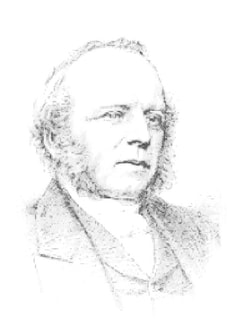
"It is the blood that maketh an atonement for the soul" (Lev. 17: 11).
"There I will meet with thee, and I will commune with thee from above the mercy-seat" (Exod. 25: 22).
READER! Have you ever felt your need of salvation! Have you ever sought it, as one who must obtain it—or perish?
When a sinner is first brought to feel sin to be a burden—when he feels wrath abiding upon his soul, and that his whole past life has been a life without God—his question is, "What must I do to be saved?" "Is it possible that my sin can ever be forgiven by a God who is angry with the wicked every day?" The awakened publican’s cry is, "O God, be merciful to me!" And this cry finds God in the very attitude of grace, proclaiming his name. "The Lord, the Lord God merciful," and pointing to the Saviour on the throne of grace, where we may obtain mercy.
In Old Testament times, the Lord set forth our condition on the one hand, and His respect toward us in the other, in one part of the furniture of the Tabernacle. He did this in the mercy-seat. This name is given to that part of the ark, in the holy of holies, whereon the blood used to be sprinkled on the day of atonement. The mercy-seat was the lid of the ark, as broad and long as the ark itself, and made of the same precious material; and the lid, or mercy-seat, being sprinkled with blood seven times, set forth to us the blood of Jesus Christ, which cleanseth from all sin.
Now, it is where the blood is, that mercy for sinners is to be found. For they deserve to die; and their deserved doom must be exhibited, and exacted at the hands of another, if they themselves are to escape. Therefore, the place where mercy can be found, is the place where the blood is. No other place, O sinner, in the wide world for you! But to that place you may come—nay, must come, if you would escape the wrath of God.
(1) You must come as a sinner. You must come with nothing but sin. On the day of atonement, the priest in Israel who came forward to the mercy-seat, laid down nothing but sin on that blood-sprinkled lid. He showed a sinner's way of coming to the Lord; and yet he brought nothing what-ever but sin, to be laid down there. So the sinner, in coming to the mercy-seat, brings nothing but sin. He confesses the sin he was born with: "Behold! I was shapen in iniquity"; and lays it down on the sprinkled blood. He confesses his inheritance of corruption from Adam, and lays it down on that mercy-seat. He confesses his own personal sins, in their various forms, aspects, aggravations; the sins of his life and lips, as far as memory can remember, and lays them down upon the sprinkled blood. He calls to mind his sins as a member of society; sins in the relations of life—sins against the Church of God, sins as one of a guilty nation, sins as a man belonging to a world lying in wickedness. And as he feels and deplores all, he lays down his innumerable sins on the mercy-seat. He tries to look in, and bring out the sins of his heart— sins of thought, feeling, affection, desire, hope. His hardness of heart, his blindness, above all, self, in its ten thousand times ten thousand forms, all are laid upon the blood-sprinkled mercy-seat. His unbelief—the grace of God, as well as His law, despised, slighted, undervalued, set aside, times without number—unbelief, even since he knew the Lord, caused by the deceitfulness of sin, by earthly care, by passing pleasure, by Satan's wiles, by a too pliable or too fearful soul—this, too, is brought out, confessed, and laid upon the blood. Yet more: the sin of his holy things is laid there too; for the very act of confession has its sin, there is some blemish in the very act of faith; there is a film in the eye that looks to the atoning Saviour. Who can understand his errors? Oh, who can declare his own heart's utter sinfulness!
At length it is done. But what does it discover? He has laid down his whole soul there—his very self; but in all this there has been nothing but sin for him to leave there! No holiness is laid down on that blood, for it is from all sin that the blood cleanses.
You come, therefore, wholly as a sinner. Nothing can be more deeply solemnising than this. To have such a burden to lay down there—to have nothing else than a burden of this kind, and to lay all this on the Lord Jesus Christ! How humbling, how fitted to lay the sinner in the dust, is the view this gives of his utter guilt and vileness! And yet nothing is more inviting, for it is with sin he comes, and as a sinner; and the Lord Jesus meets the sin and the sinner. Is there, then, any room for delay? any ground for excuse for hesitating to come at once? --Andrew Bonar; The Mercy Seat
"There I will meet with thee, and I will commune with thee from above the mercy-seat" (Exod. 25: 22).
READER! Have you ever felt your need of salvation! Have you ever sought it, as one who must obtain it—or perish?
When a sinner is first brought to feel sin to be a burden—when he feels wrath abiding upon his soul, and that his whole past life has been a life without God—his question is, "What must I do to be saved?" "Is it possible that my sin can ever be forgiven by a God who is angry with the wicked every day?" The awakened publican’s cry is, "O God, be merciful to me!" And this cry finds God in the very attitude of grace, proclaiming his name. "The Lord, the Lord God merciful," and pointing to the Saviour on the throne of grace, where we may obtain mercy.
In Old Testament times, the Lord set forth our condition on the one hand, and His respect toward us in the other, in one part of the furniture of the Tabernacle. He did this in the mercy-seat. This name is given to that part of the ark, in the holy of holies, whereon the blood used to be sprinkled on the day of atonement. The mercy-seat was the lid of the ark, as broad and long as the ark itself, and made of the same precious material; and the lid, or mercy-seat, being sprinkled with blood seven times, set forth to us the blood of Jesus Christ, which cleanseth from all sin.
Now, it is where the blood is, that mercy for sinners is to be found. For they deserve to die; and their deserved doom must be exhibited, and exacted at the hands of another, if they themselves are to escape. Therefore, the place where mercy can be found, is the place where the blood is. No other place, O sinner, in the wide world for you! But to that place you may come—nay, must come, if you would escape the wrath of God.
(1) You must come as a sinner. You must come with nothing but sin. On the day of atonement, the priest in Israel who came forward to the mercy-seat, laid down nothing but sin on that blood-sprinkled lid. He showed a sinner's way of coming to the Lord; and yet he brought nothing what-ever but sin, to be laid down there. So the sinner, in coming to the mercy-seat, brings nothing but sin. He confesses the sin he was born with: "Behold! I was shapen in iniquity"; and lays it down on the sprinkled blood. He confesses his inheritance of corruption from Adam, and lays it down on that mercy-seat. He confesses his own personal sins, in their various forms, aspects, aggravations; the sins of his life and lips, as far as memory can remember, and lays them down upon the sprinkled blood. He calls to mind his sins as a member of society; sins in the relations of life—sins against the Church of God, sins as one of a guilty nation, sins as a man belonging to a world lying in wickedness. And as he feels and deplores all, he lays down his innumerable sins on the mercy-seat. He tries to look in, and bring out the sins of his heart— sins of thought, feeling, affection, desire, hope. His hardness of heart, his blindness, above all, self, in its ten thousand times ten thousand forms, all are laid upon the blood-sprinkled mercy-seat. His unbelief—the grace of God, as well as His law, despised, slighted, undervalued, set aside, times without number—unbelief, even since he knew the Lord, caused by the deceitfulness of sin, by earthly care, by passing pleasure, by Satan's wiles, by a too pliable or too fearful soul—this, too, is brought out, confessed, and laid upon the blood. Yet more: the sin of his holy things is laid there too; for the very act of confession has its sin, there is some blemish in the very act of faith; there is a film in the eye that looks to the atoning Saviour. Who can understand his errors? Oh, who can declare his own heart's utter sinfulness!
At length it is done. But what does it discover? He has laid down his whole soul there—his very self; but in all this there has been nothing but sin for him to leave there! No holiness is laid down on that blood, for it is from all sin that the blood cleanses.
You come, therefore, wholly as a sinner. Nothing can be more deeply solemnising than this. To have such a burden to lay down there—to have nothing else than a burden of this kind, and to lay all this on the Lord Jesus Christ! How humbling, how fitted to lay the sinner in the dust, is the view this gives of his utter guilt and vileness! And yet nothing is more inviting, for it is with sin he comes, and as a sinner; and the Lord Jesus meets the sin and the sinner. Is there, then, any room for delay? any ground for excuse for hesitating to come at once? --Andrew Bonar; The Mercy Seat
==horatius bonar==========
(19 December 1808 – 31 July 1889)
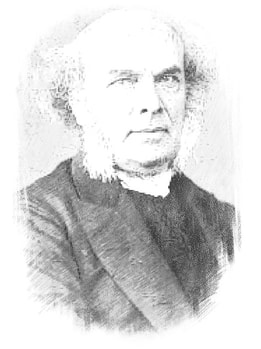 Horatio Bonar Files
Horatio Bonar Files
The history of six thousand years of evil has heen lost on man. He refuses to read its awful lesson regarding sin and God's displeasure against the sinner, which that history records. The flood of evil that has issued forth from one single sin he has forgotten. The death, the darkness, the sorrow, the sickness, the tears, the weariness, the madness, the confusion, the bloodshed, the furious hatred between man and man, making Earth a suburb of Hell -- all this is overlooked or misread. Man repels the thought that sin is crime which God hates with an infinite hate and which he, in his righteousness, must condemn and avenge.
If sin is such a surface thing, such a trifle as men deem it, what is the significance of this long sad story? Do earth's ten thousand graveyards, where human love lies buried, tell no darker tale? Do the millions upon millions of broken hearts and heavy eyes say that sin is but a trifle? Do the moaning of the hospital or the carnage of the battlefield, the blood-stained sword, and the death-dealing artillery proclaim that sin is a mere casualty and the human heart the seat of goodness after all? Do the earthquake, the volcano, the hurricane, the tempest speak nothing of sin's desperate evil? Do not man's aching head, and empty heart, and burdened spirit, and shaded brow, and weary brain, and tottering limbs utter -- in a voice articulate beyond mistake -- that sin is guilt? And do they not utter that guilt must be punished -- punished by the iudge of all -- not as a mere "violation of natural laws," but as a breach of the eternal law, which admits of no reversal: "The soul that sins, it shall die?" For without law, sin is nothing. "The strength of sin is the law" (1 Corinthians 15:56), and he who makes light of sin must defend moral confusion and injustice. He who refuses to recognize sin as guilt must dissolve the law of the universe or ascrihe imbecility and injustice to the Judge of all.
The world has grown old in sin. It has now more than ever hegun to trifle with it, either as a necessity which cannot he cured, or a partial aberration from good order which will rectify itself ere long. It is this tampering with evil, this refusal to see sin as God sees it, as the law declares it, and as the story of our race has revealed it, that has in all ages been the root of error and of wide departure from the faith once delivered to the saints. Admit the evil of sin with all its eternal consequences, and you are shut up to a divine way of dealing with it. Deny the evil of sin and the future results of that evil, and you may deny the whole revelation of God, set aside the cross, and abrogate the law. ---Horatius Bonar (The Everlasting Righteousness)
If sin is such a surface thing, such a trifle as men deem it, what is the significance of this long sad story? Do earth's ten thousand graveyards, where human love lies buried, tell no darker tale? Do the millions upon millions of broken hearts and heavy eyes say that sin is but a trifle? Do the moaning of the hospital or the carnage of the battlefield, the blood-stained sword, and the death-dealing artillery proclaim that sin is a mere casualty and the human heart the seat of goodness after all? Do the earthquake, the volcano, the hurricane, the tempest speak nothing of sin's desperate evil? Do not man's aching head, and empty heart, and burdened spirit, and shaded brow, and weary brain, and tottering limbs utter -- in a voice articulate beyond mistake -- that sin is guilt? And do they not utter that guilt must be punished -- punished by the iudge of all -- not as a mere "violation of natural laws," but as a breach of the eternal law, which admits of no reversal: "The soul that sins, it shall die?" For without law, sin is nothing. "The strength of sin is the law" (1 Corinthians 15:56), and he who makes light of sin must defend moral confusion and injustice. He who refuses to recognize sin as guilt must dissolve the law of the universe or ascrihe imbecility and injustice to the Judge of all.
The world has grown old in sin. It has now more than ever hegun to trifle with it, either as a necessity which cannot he cured, or a partial aberration from good order which will rectify itself ere long. It is this tampering with evil, this refusal to see sin as God sees it, as the law declares it, and as the story of our race has revealed it, that has in all ages been the root of error and of wide departure from the faith once delivered to the saints. Admit the evil of sin with all its eternal consequences, and you are shut up to a divine way of dealing with it. Deny the evil of sin and the future results of that evil, and you may deny the whole revelation of God, set aside the cross, and abrogate the law. ---Horatius Bonar (The Everlasting Righteousness)
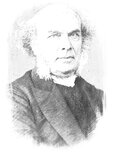 Horatio Bonar
Horatio Bonar
“For we are not saved by believing in our own salvation, nor by believing anything whatsoever about ourselves. We are saved by what we believe about the Son of God and His righteousness. The gospel believed saves; not the believing in our own faith.”
― Horatius Bonar, The Everlasting Righteousness
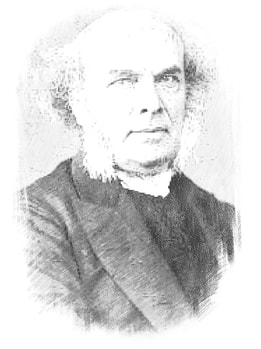 Horatio Bonar Files
Horatio Bonar Files
Let us speak reverently of the Jew. Let us not misjudge him by present appearances. He is not what he once was, nor what he yet shall be.
Let us speak reverently of the Jew. We have much cause to do so. What, though all Christendom, both of the East and West, has for nearly eighteen centuries treated him as the offscouring of the race? What though Mohammad has taught his followers to revile and persecute the sons of Abraham? . . .
Nay, what though he [the Jew] may have a grasping hand, and a soul shut up against the world,--a world that has done nothing but wrong and revile him? What though he may inherit the crookedness of his father Jacob, instead of the nobility of Abraham, or the simply gentleness of Isaac?
Still let us speak reverently of the Jew,--if not for what he is, at least for what he was, and what he shall be, when the Redeemer shall come to Zion and turn away ungodliness from Jacob [Isa. 59:20; see. Rom. 11:26].
In him we see the development of God's great purpose as to the woman's seed, the representative of a long line of kings and prophets, the kinsmen of Him who is the Word made flesh. It was a Jew who sat on one of the most exalted thrones on earth; it is a Jew who sits upon the throne of heaven. It was a Jew who wrought such miracles once on our earth, who spoke such gracious words. It was a Jew who said, "Come unto me and I will give you rest;" and a Jew who said, "Behold I come quickly, and my reward is with me." It was Jewish blood that was shed on Calvary; it was a Jew who bore our sins in His own body on the tree. It was a Jew who died, and was buried, and rose again. It is a Jew who liveth to intercede for us, who is to come in glory and majesty as earthly judge and monarch. It is a Jew who is our Prophet, our Priest, our King.
Let us, then, speak reverently of the Jew, whatever his present degradation may be. Just as we tread reverently the level platform of Moriah, where once stood the holy house where Jehovah was worshipped; so let us tread the ground where where they dwell whose are the adoption, and the glory, and the covenants, and of whom, concerning the flesh, Christ came. That temple hill is not what it was. The beautiful house is gone, and not one stone is left upon another. The seventeen sieges of Jerusalem, like so many storms rolling the waves of every sea over it, have left few memorials of the old magnificence. The Mosque of the Moslems covers the spot of the altar of burnt-offering; the foot of the Moslem defiles the sacred courts . . . But still the ground is felt to be sacred; the bare rock on which you tread is not common rock; the massive stones built here and there into the wall are witnesses of other days; and the whole scene gathers round it such associations as, in spite of the rubbish, and desolation, and ruin, and pollution, fill you irresistibly with awe . . .
So it is with the Jew,—I mean the whole Jewish nation. There are indelible memories connected with them, which will ever, to anyone who believes in the Bible, prevent them from being contemned; nay, will cast around them a nobility and a dignity which no other nation has possessed or can attain to. To Him in whose purposes they occupy so large a space, they are still “beloved for their fathers’ sake” [Rom. 11:28]. Of them, as concerning the flesh, Christ came, who is over all, God blessed forever.
--- Excerpt from Horatius Bonar (The Jew):
Let us speak reverently of the Jew. We have much cause to do so. What, though all Christendom, both of the East and West, has for nearly eighteen centuries treated him as the offscouring of the race? What though Mohammad has taught his followers to revile and persecute the sons of Abraham? . . .
Nay, what though he [the Jew] may have a grasping hand, and a soul shut up against the world,--a world that has done nothing but wrong and revile him? What though he may inherit the crookedness of his father Jacob, instead of the nobility of Abraham, or the simply gentleness of Isaac?
Still let us speak reverently of the Jew,--if not for what he is, at least for what he was, and what he shall be, when the Redeemer shall come to Zion and turn away ungodliness from Jacob [Isa. 59:20; see. Rom. 11:26].
In him we see the development of God's great purpose as to the woman's seed, the representative of a long line of kings and prophets, the kinsmen of Him who is the Word made flesh. It was a Jew who sat on one of the most exalted thrones on earth; it is a Jew who sits upon the throne of heaven. It was a Jew who wrought such miracles once on our earth, who spoke such gracious words. It was a Jew who said, "Come unto me and I will give you rest;" and a Jew who said, "Behold I come quickly, and my reward is with me." It was Jewish blood that was shed on Calvary; it was a Jew who bore our sins in His own body on the tree. It was a Jew who died, and was buried, and rose again. It is a Jew who liveth to intercede for us, who is to come in glory and majesty as earthly judge and monarch. It is a Jew who is our Prophet, our Priest, our King.
Let us, then, speak reverently of the Jew, whatever his present degradation may be. Just as we tread reverently the level platform of Moriah, where once stood the holy house where Jehovah was worshipped; so let us tread the ground where where they dwell whose are the adoption, and the glory, and the covenants, and of whom, concerning the flesh, Christ came. That temple hill is not what it was. The beautiful house is gone, and not one stone is left upon another. The seventeen sieges of Jerusalem, like so many storms rolling the waves of every sea over it, have left few memorials of the old magnificence. The Mosque of the Moslems covers the spot of the altar of burnt-offering; the foot of the Moslem defiles the sacred courts . . . But still the ground is felt to be sacred; the bare rock on which you tread is not common rock; the massive stones built here and there into the wall are witnesses of other days; and the whole scene gathers round it such associations as, in spite of the rubbish, and desolation, and ruin, and pollution, fill you irresistibly with awe . . .
So it is with the Jew,—I mean the whole Jewish nation. There are indelible memories connected with them, which will ever, to anyone who believes in the Bible, prevent them from being contemned; nay, will cast around them a nobility and a dignity which no other nation has possessed or can attain to. To Him in whose purposes they occupy so large a space, they are still “beloved for their fathers’ sake” [Rom. 11:28]. Of them, as concerning the flesh, Christ came, who is over all, God blessed forever.
--- Excerpt from Horatius Bonar (The Jew):
St. Bonaventure

We must suspend all the operations of the mind and we must transform the peak of our affections, directing them to God alone. This is a sacred mystical experience. It cannot be comprehended by anyone unless he surrenders himself to it; nor can he surrender himself to it unless he longs for it; nor can he long for it unless the Holy Spirit, whom Christ sent into the world, should come and inflame his innermost soul. . . .
If you ask how such things can occur, seek the answer in God’s grace, not in doctrine; in the longing of the will, not in the understanding; in the sighs of prayer, not in research; seek the bridegroom not the teacher; God and not man; darkness not daylight; and look not to the light but rather to the raging fire that carries the soul to God with intense fervor and glowing love. The fire is God, and the furnace is in Jerusalem, fired by Christ in the ardor of his loving passion. . . .
Let us die, then, and enter into the darkness, silencing our anxieties, our passions and all the fantasies of our imagination. Let us pass over with the crucified Christ from this world to the Father, so that, when the Father has shown himself to us, we can say with Philip: “It is enough.” We may hear with Paul: “My grace is sufficient for you”; and we can rejoice with David, saying, “My flesh and my heart fail me, but God is the strength of my heart and my heritage forever. Blessed be the Lord forever, and let all the people say: Amen.”
--St. Bonaventure (1221–74). In The Journey of the Mind to God
If you ask how such things can occur, seek the answer in God’s grace, not in doctrine; in the longing of the will, not in the understanding; in the sighs of prayer, not in research; seek the bridegroom not the teacher; God and not man; darkness not daylight; and look not to the light but rather to the raging fire that carries the soul to God with intense fervor and glowing love. The fire is God, and the furnace is in Jerusalem, fired by Christ in the ardor of his loving passion. . . .
Let us die, then, and enter into the darkness, silencing our anxieties, our passions and all the fantasies of our imagination. Let us pass over with the crucified Christ from this world to the Father, so that, when the Father has shown himself to us, we can say with Philip: “It is enough.” We may hear with Paul: “My grace is sufficient for you”; and we can rejoice with David, saying, “My flesh and my heart fail me, but God is the strength of my heart and my heritage forever. Blessed be the Lord forever, and let all the people say: Amen.”
--St. Bonaventure (1221–74). In The Journey of the Mind to God
richard bonnke
Jan 2, 2015: Charisma: What Reinhard Bonnke Told Thousands of Youth at Onething
Reinhard Bonnke has led 76 million people to the Lord during the course of his 60 years in ministry. The evangelist that has had over one million people in his meetings declared to the over 20,000 conference attendees in Kansas City that "America will be saved."
Reinhard Bonnke has led 76 million people to the Lord during the course of his 60 years in ministry. The evangelist that has had over one million people in his meetings declared to the over 20,000 conference attendees in Kansas City that "America will be saved."
thomas boston
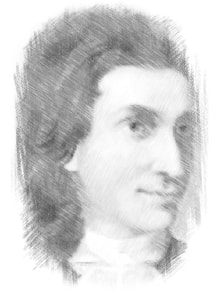 Thomas Boston
Thomas Boston
Just as a person who has fallen into a pit cannot be expected to help themselves out of it except through one of two ways—either by relying solely on their own efforts or by seizing and utilizing the help offered by others—likewise, an unconverted person cannot be expected to help themselves out of their natural state except through either the path of the law or the covenant of works, by relying solely on their own efforts without Christ, or through the path of the Gospel or the covenant of grace, by exerting their own strength to lay hold of and make use of the help offered by a Saviour. But alas! the unconverted person is dead in the pit and cannot help themselves in either of these ways. Not the first way, for the first passage tells us that when our Lord came to help us, "we were without strength," unable to recover ourselves. We were ungodly, burdened with guilt and wrath, yet "without strength," unable to endure it or remove it. Thus, all of mankind would undoubtedly have perished had not "Christ died for the ungodly" and brought help to those who could never have recovered themselves. But when Christ comes and offers help to sinners, can they accept it? Can they make use of the help when it is within their reach? No, the second passage tells us they cannot. "No one can come to me," that is, believe in me, John 6:44, "unless the Father draws him." This drawing is what enables them to come when previously they could not; it enables them to come and make use of the offered help. It is a drawing that is always effective, for it can be nothing less than "hearing and learning from the Father," which leads everyone who partakes in it to come to Christ, verse 45. Therefore, it is not merely a moral persuasion but a drawing by mighty power, Ephesians 1:12, which is absolutely necessary for those who have no power in themselves to come and take hold of the offered help. --Thomas Boston; Human Nature in its Fourfold State
“As the Lord loveth a cheerful giver, so likewise a cheerful thanksgiver.” --John Boys





